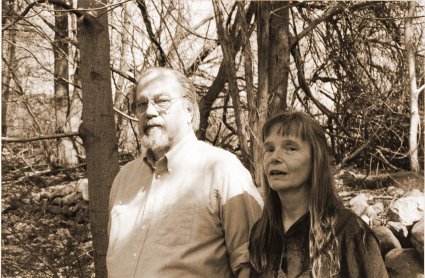THE LOST CHILDREN
Sonnets
CLXV-CLXXII, from THE SPACE SONNETS
by Dick Allen
Seven of us started toward the mountains,
Walking, staffs in hand, robes trailing
In the wet dew of the fields. We meant
To find what happened there--and if some children
Had survived, to bring them back with us
And bury those who died. The upward trails
Still held some snow, but here and there upon
Ledges in the sun we found the small
White and purple violets they loved,
A toy dropped in a stream, a little house
Of sticks, picnic refuse, words they'd carved
In birch and poplar bark, a necklace cross.
Tears came to our eyes with each new sign
We found on pasture slope or hill incline.
That first night, grouped around a fire
In which, it seemed, their faces leaped and called,
We said what prayers we could. Quietly,
We talked among ourselves of what we'd heard
About the one they sought, that burned-face man
Who promised love, who preached the end
Of selfishness, and hate, and war. Therefore
Those who followed him would save the world.
Or if the world could not be saved, with him
They'd find, at least, another way of life
Within these mountains. God would speak to them
Daily, nightly, keep them safe from grief.
Although we cursed that prophet, still we knew
If we were children, we'd have followed, too.
At morning, I awoke before the others. Down
The glade, beside a forking meadow creek,
I caught quick glimpses of a tiny fawn
Following its mother, playing hide-and-seek
With shadows and with sun. Propped upon
One elbow, eyes still blurry, right hip sore
From the root it pressed against all night,
I watched like some conspirator
A king has sent to spy upon the farthest
And most lonely reaches of his land--
What goes on there, whether it would prove
Safe refuge should he ever be dethroned.
The doe and fawn soon vanished. Thereupon,
I woke the others, but still felt alone.
Some wild animal had pawed the shallow grave
Where the first child lay. They'd done their best
To bury her: rocks heaped upon the mound, a small
Cross of sticks above her head. They'd dressed
Her in a pinafore and laid upon her breast
A wreath of daisies. But her face looked thin
And terrified. We knelt and prayed and then
Buried her deeper. In the next days, as we crossed
Gullies and rivers, we found many more
Of the children, none alive--but never one
Sign of the prophet. How near, how near
They must have thought him as they climbed
Toward him. How deeply runs the simple need
For simple answers and a simple creed.
None alive, none. At the end, they seemed
To have just given up, laid down in the prettiest spot
They could find and let themselves dream
Into death. Yet still, the prophet was not
Among their bodies. The boulders grew more frequent,
The trail harsher. Where was he taking them?
What mad vision possessed his spirit
That he could lead them so? Did he condemn
Any who lagged? Did he promise the dying
They would have a higher place in heaven
Because they'd followed him? What god-awful resonance
There must have been to his voice! And then
We found the prophet's body. On a mountain cliff,
In a grove of pines, the man had hanged himself.
Beneath the prophet's dangling body lay
A felt-bound book. We opened it. We read
Of trees with bulging eyes, soul-lakes, a splay
Of levitating flowers. In the dead
Wings of a moth he'd found a map of Hell.
One night he'd seen God walking on the moon;
Another, on a lonely railroad trestle
He'd spoken with two angels. "Doomed,"
Said Brother Luke. We cut his body down
And sealed it in a cave. Oh God, I thought, Oh God,
My visions are like his. Are we then one,
Following the dictates of some secret code
Leading to this? Is my doubt enough
To save me from the madness of blind faith?
Our journey back was arduous and silent.
It was as if, should we start talking of those scenes,
We'd reveal the growing hatred we now felt
Toward God. How could He allow these children
To die so horribly? Before their minds were ready,
Before they knew the obligations of free will,
Before they could reason, before they could choose, why did He
Let them be deceived? "Horrible, horrible, horrible,"
Sister Patricia chanted as she wept
And kept her eyes averted. Worse,
Once in the distance, almost out of sight,
We saw another band of children press
Into the mountains. We were helpless. We
Walked apart and none of us could pray.
This is the greatest mystery: why Death
Throws dark robes on the young and pure and innocent
While those corrupted, those who knowingly
Choose evil often live their whole lives out.
Why, God, why? Since you can foresee all,
Do you save them from much greater agonies ahead?
Or even in their brief lives, had they passed
Some secret test of yours and were rewarded
By joining you much sooner than they would?
We could not solve it by ourselves. The last
Evening in the mountains, we began to speak
To one another, once again. We linked
Our calloused hands, and wept. Our brothers
And our sisters came to meet us through the stars.

